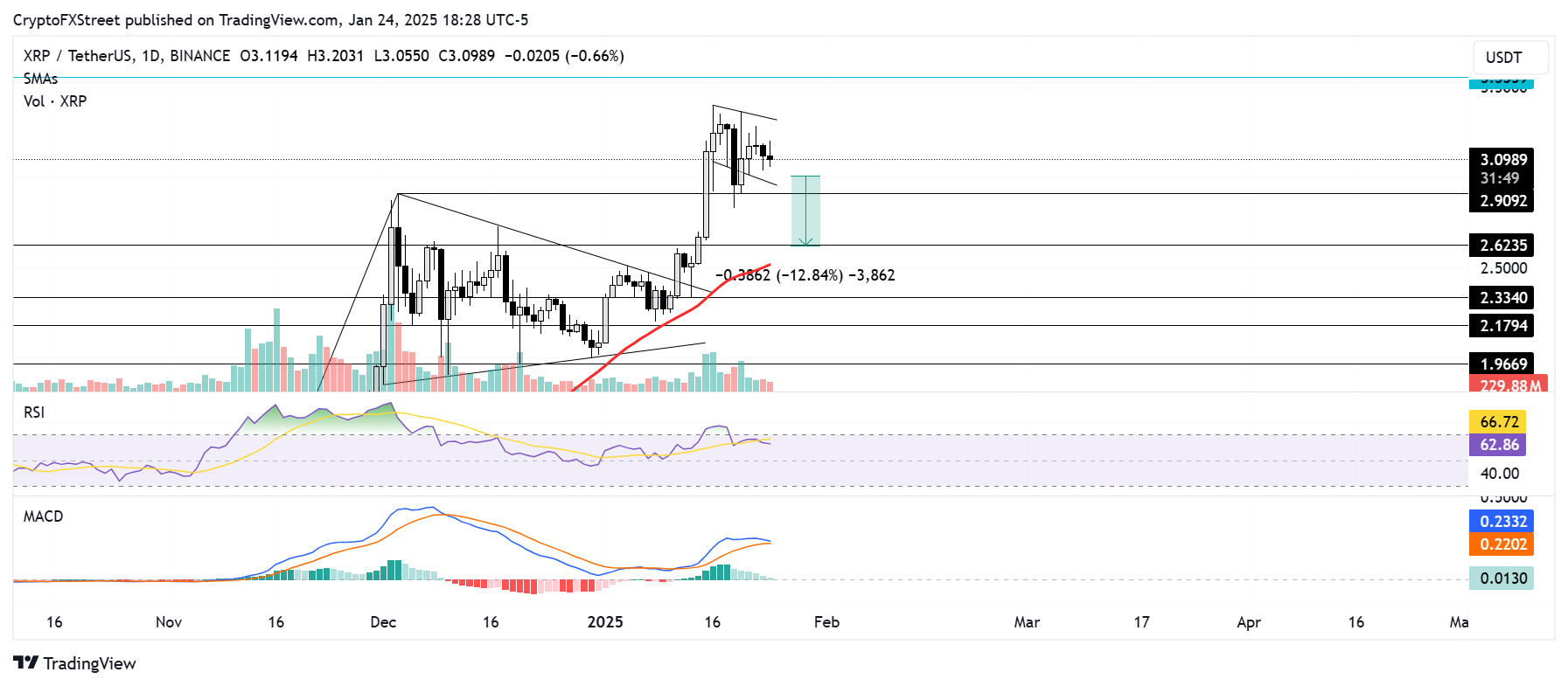XRP could see a 15% decline following Ripple's request to file cross-appeal brief on April 16
- Ripple filed a request stating it wishes to submit a cross-appeal brief in its case with the SEC on April 16.
- The crypto community anticipates that the new SEC will withdraw the case against Ripple considering its recent pro-crypto moves.
- XRP could complete a 15% decline following signs of rising bearish pressure across its technical indicators.
XRP's price remained weak on Friday following Ripple's filing to the US Court of Appeals for the Second Circuit. Ripple seeks to submit its cross-appeal brief by April 16 after the Securities & Exchange Commission (SEC) filed its appeal brief last week against Judge Analisa Torres's ruling.
Ripple solicits submission of cross-appeal brief by April 16
In the latest development in the SEC vs Ripple case, Ripple filed an official statement proposing a date for its cross-appeal brief.
The proposal, issued to the US Court of Appeals for the Second Circuit, stated that Ripple had requested April 16 as the due date for its brief.
"Under this Court's Rule 31.2(a)1(B), Ripple requests a due date of April 16, 2025 for its brief," the filing stated.
Ripple's cross-appeal brief will seek to tackle the points raised by the SEC in its opening brief submitted last week.
The regulator argued that Judge Torres's ruling in July 2023 was wrong and that Ripple's sales of XRP to retail investors were a securities offering.
In addition to the SEC's stance, non-profit firm Better Markets filed an Amicus Brief on Wednesday, supporting the agency's claim against Judge Torres's verdict. The firm urged that the court overturn what it termed "especially consequential and legally erroneous aspects of the district court's decision."
However, Ripple's Chief Legal Officer Stuart Alderoty mentioned that the SEC's appeal is a "rehash of already failed arguments."
The crypto community remains optimistic that the court will stay in favor of the company and uphold Judge Torres's decision. The positive sentiment is tied to the new SEC administration’s progress under acting Chair Mark Uyeda in countering some of the actions of the previous leadership under Gary Gensler.
This includes revoking the controversial Staff Accounting Bulletin (SAB 121) on Thursday, which was seen as a major win for the industry.
The crypto community expects the new SEC administration to drop the case against Ripple, as it has shown good progress in establishing clear regulatory guidelines for the digital asset industry.
Additionally, Ripple executives, including CEO Brad Garlinghouse, appeared at President Donald Trump's inauguration, a potential move to strengthen ties with the current presidential administration.
XRP could complete a 15% decline following bearish signs in technical indicators
XRP saw $4.97 million in futures liquidations in the past 24 hours, per Coinglass data. The total amount of long and short liquidations accounted for $2.90 million and $2.07 million, respectively.
XRP is trading within a key descending channel as it continues its week-long consolidation. Since its heavy decline last weekend, XRP bulls seem to have run out of steam.

XRP/USDT daily chart
XRP could find support at the channel's lower boundary near $2.90. A bounce off this level could see the remittance-based token rising to test the channel's upper boundary resistance.
However, a move below the channel's support and the $2.90 level could see XRP complete a 15% decline to $2.62.
Meanwhile, the Moving Average Convergence Divergence (MACD) line looks set to cross below its signal line while its histogram tests its neutral level line. Crosses below the signal line and neutral level could spark increased bearish pressure for XRP. The Relative Strength Index (RSI) is below its overbought region.
A daily candlestick close above $3.40 will invalidate the bearish thesis.
SEC vs Ripple lawsuit FAQs
It depends on the transaction, according to a court ruling released on July 14, 2023: For institutional investors or over-the-counter sales, XRP is a security. For retail investors who bought the token via programmatic sales on exchanges, on-demand liquidity services and other platforms, XRP is not a security.
The United States Securities & Exchange Commission (SEC) accused Ripple and its executives of raising more than $1.3 billion through an unregistered asset offering of the XRP token. While the judge ruled that programmatic sales aren’t considered securities, sales of XRP tokens to institutional investors are indeed investment contracts. In this last case, Ripple did breach the US securities law and had to pay a $125 million civil fine.
The ruling offers a partial win for both Ripple and the SEC, depending on what one looks at. Ripple gets a big win over the fact that programmatic sales aren’t considered securities, and this could bode well for the broader crypto sector as most of the assets eyed by the SEC’s crackdown are handled by decentralized entities that sold their tokens mostly to retail investors via exchange platforms, experts say. Still, the ruling doesn’t help much to answer the key question of what makes a digital asset a security, so it isn’t clear yet if this lawsuit will set precedent for other open cases that affect dozens of digital assets. Topics such as which is the right degree of decentralization to avoid the “security” label or where to draw the line between institutional and programmatic sales persist.
The SEC has stepped up its enforcement actions toward the blockchain and digital assets industry, filing charges against platforms such as Coinbase or Binance for allegedly violating the US Securities law. The SEC claims that the majority of crypto assets are securities and thus subject to strict regulation. While defendants can use parts of Ripple’s ruling in their favor, the SEC can also find reasons in it to keep its current strategy of regulation by enforcement.
(Removed)




